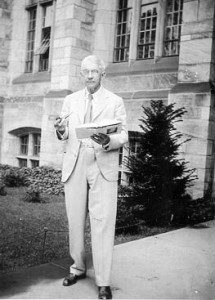 To John Hall Wheelock
To John Hall Wheelock
Via Santo Stefano Rotondo, 6
Rome. October 13, 1945
I see that you take kindly to my ugly ducklings. This morning I left at Miss Tindall’s the MS of one of the two plays, Philosophers at Court, which is long, in blank verse, and represents the visit of Plato to Sicily, to reform the government of Dionysius—the Younger, in my non-historical arrangement—and his discomfiture there. I am satisfied with the form this play has now taken, and will send you a copy as soon as Miss Tindall has typed it. I don’t think it will be much liked, although symbolically it is not without application to the present state of affairs: it is pessimistic—but gaily pessimistic, which perhaps makes it worse. I believe I have already written to you about some complaints I have received about Persons & Places, to the effect that I don’t say how good all my friends were, in spite of small defects in them which I ought not to have hinted at. Lyon Phelps made the same criticism about The Last Puritan, that there was not a single good person in the book: and this, by the same criterion, will be doubly true of Philosophers at Court. And somehow the same fatality—the absence of goodness in everybody—pursues the other play: The Marriage of Venus. This is short, and in rhymed verse after the manner of my Lucifer. The plot and the principal scenes seem to me all right: but there are horrible lax, flaccid passages and superfluous “poetic” expressions. I think, however, that without trusting to any positive new inspiration at my age, I can trust my experience to make negative corrections, chiefly omissions, and substitution of terse for conventional “poetic” language in various places. For instance, I can make these Olympians call one another you instead of thou and thee; and I can change their names from Greek to Latin, which is more intelligible in English, and lends itself better for comedy. I mean, then, to rewrite this play: otherwise I should be ashamed to publish it. You must therefore be patient, if you want the two plays to appear together. Meantime I shall be curious to see what you think of Philosophers at Court.
From The Letters of George Santayana: Book Seven, 1941-1947. Cambridge, MA: The MIT Press, 2006.
Location of manuscript: Department of Rare Books and Special Collections, Princeton University Libraries, Princeton NJ
